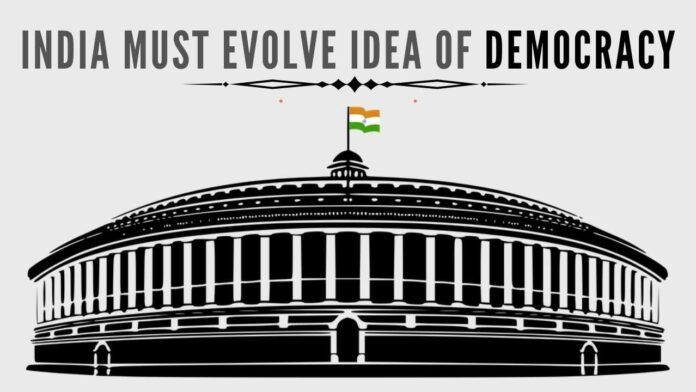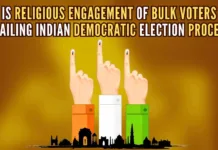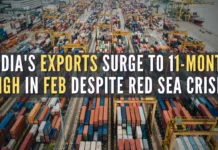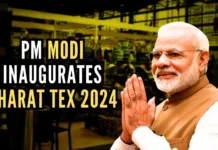
Does India hold the key to the future of Democracy?
A diverse, developing, and democratic India, despite somewhat lackadaisical performance on most parameters of governance and security, especially compared to its northern neighbour, holds the key to credibility and desirability of open political systems. A stronger India can not only stabilize the global order but also act as the biggest antidote to both Islamic radicalism and opaque authoritarianism. The world’s largest democracy, however, may have to reinvent, or at least remold, many of its key principles and practices of governance. It must do so by refining and strengthening, but not eroding, the core ingredients of democracy such as rule of law, the integrity of electoral processes, the autonomy of institutions, equality of opportunity, free media, and secure common spaces among others. Its ability to build a robust governance-security apparatus, within a democratic framework, can offer a new lease of life to the idea of democracy, which seems to be hurtling towards a dead-end, if not an imminent collapse.
What inspires hope in such potential and capacity of India is its ability to sustain an open and competitive political system under the most difficult circumstances. This would never have been possible without the resilience of its original and eternal values. Simultaneously, a transformation in the governance-security capacity of Indian democracy has become indispensable for defending some of its existential interests and priorities. What reinforces such belief is the fact that no major state or civilization in the entire human history has ever been able to transform the plight of its people or achieve extra-ordinary advancement, through a political governance apparatus that has evolved in response to the needs of people in different social-cultural and economic contexts.
Today, this process runs the risk of losing both momentum and direction. Under these circumstances, the ability of India to refine the very idea of democracy can offer new hope to the world.
Westminster’s model of democracy, notwithstanding its sustenance and strengths in the Indian context, appears incapable of pursuing an ambitious agenda of accelerated and comprehensive transformation that India needs at this juncture. Hence, India has to explore a more advanced version of democracy, that can be captioned as Indocracy, to suit its own contexts, challenges, and priorities.
Current global context
The sustained economic, military and technological ascendance of China, under an authoritarian and opaque political system, threatens to erode access to security, freedom, and equitable opportunities at a much wider scale. This is especially in the context of expanding fissures and inequalities in even some of the established democracies, alongside serious institutional fragility in their counterparts in the developing world. Western democracies largely appear more content at managing their own internal challenges but China has gone on to steadily expand its global influence from the Far East, Indian Ocean, South Asia, Central Asia, West Asia, Africa to most parts of Europe and going all the way to critical pockets of South America. It has managed to create pockets of support in many of these states through such non-transparent means that have not only been accentuating steeper inequality but also threatening political openness and transparency at a global scale. Amidst the Increasing unsustainability of worldwide American influence and their sharpening domestic divides, such a scenario threatens a far larger number of people and societies than what appears at the outset.
A closer look at China’s economic, military and technological transformations suggests that these have been carefully crafted to enhance the cost and risk of US intervention from the Far East to most parts of Asia. China has also significantly bridged the gap, and even acquired some degree of tactical advantages in the eventuality of a localized conflict in Asia, through its recent advancements in the land, air, underwater, satellite, and cyber warfare capabilities. These, added by some of its highly feted short to medium range hypersonic and ISR (Information, surveillance, and reconnaissance) weapon systems and burgeoning naval capacity, appear to have created a near impregnable shield for mainland China and areas around it.
Simultaneously, China has forged way ahead of India on nearly all major indicators of national power. In foreseeable future, India may struggle to defend some of its legitimate security interests at a sustainable cost, leave aside matching or containing China. Nevertheless, the resilience of an open system, if defended well, can throw up such powerful ideas and dynamic initiatives that can alter such an equation. Simultaneously, the Chinese system may still crumble under contradictions of its own opaqueness. The eventual outcome shall depend on the quality of initiatives that the leaders and stakeholders in the two states undertake.
A compulsion for the advancement of the idea of democracy further increases with the worldwide erosion in values and norms of democracy and subversion of its key institutions. Simultaneously, various shades of authoritarian regimes have continued to entrench themselves, by rigging the integrity of electoral processes. Such trends threaten to derail the larger process of democratization that had gained momentum since the end of the second-word war. Large-scale decolonization, adoption of the Universal Declaration of Human Rights (UDHR), the emergence of welfare state followed by stabilization of electoral processes in a larger number of states, and eventual collapse of communism in Soviet Russia and Eastern Europe, had been nudging the world towards greater respect for human life and human dignity, rule of law, political transparency and accountability. Today, this process runs the risk of losing both momentum and direction. Under these circumstances, the ability of India to refine the very idea of democracy can offer new hope to the world.
Constraints of Indian Democracy
However, there are serious obstacles and challenges in this direction. India’s political culture is yet to extricate itself from the medieval psyche of status-based entitlements and discriminations. Instead of being eliminated by a merit-based competitive political system, these have only transitioned to a newer form to creep into political, corporate, and bureaucratic institutions to retard their capacity and output. These continue to dent the efficacy and credibility of mechanisms to administer rule of law. Hence, the overall regulatory capacity of the Indian state has remained suboptimal, hindering overall governance-security output. Appalling performance on most HDI parameters, a somewhat sluggish and expensive criminal justice system with frequent miscarriages of justice, an archaic red-tape laden bureaucratic structure-albeit with many brilliant minds in its ranks, a poorly regulated and deficiently competitive private sector amidst allegations of crony capitalism, the sub-par output of R&D institutions, among others, appear outcome of such governance structures and processes whose integrity has been subverted.
Simultaneously, the Indian state has also not been able to transform its strategic psyche despite the bitter experience of external occupation and centuries of colonial subjugation. This is manifest in India’s inability to conclude covert war from Pakistan- despite spectacular military victories in 1965, 1971, and even the Kargil conflict of 1999. The inability of India’s stakeholders to fathom the national security implications of expanding asymmetry of power in favour of China, or suitably respond to the same, reinforces doubt in the strategic psyche of India’s policymakers. Despite deeper cultural, civilizational, and linguistic bonds with its smaller neighbours, India has struggled to secure their territories from prejudicial use by hostile forces. Inability to develop adequate indigenous defence hardware capacity, despite enormous military threats as well as access to a pool of skilled manpower, India had chosen, until recently, to remain the biggest importer of armament amidst allegations of sleaze and graft in every defence deal. This only points to a serious underlying malaise. Due to poor governance systems and deficient security mechanisms, many critical programmes on national security continue to get dislocated. Some of the most brilliant minds working on cutting-edge technologies or projects that can provide a major breakthrough towards the advancement of India in any sphere suddenly face serious harassment and at times get eliminated under intriguing circumstances. These only lend credence to the perception that under-performance, inefficiency, corruption, and subversion remain inbuilt in many of the institutional structures and practices of Indian democracy. However, these have not deterred multiple instances of exceptional individual brilliance, integrity, and quest for excellence under most difficult circumstances. This is the strength of India, if harnessed well, can transform the world.
Why India better placed to spearhead innovation in Democracy
Longer roots of a humanist civilization, with probably the earliest traditions of political accountability and transparency, besides the success of democracy under most difficult circumstances, make India the best suited to spearhead a major innovation in the idea of democracy. Democracy had evolved in Europe only after wider prosperity had dawned from the wealth extracted from erstwhile colonies of Asia and Africa. Similarly, democracy in North America or Oceania had followed the capture of vast territories with all the natural resources, by virtually wiping out nearly the entire indigenous population. Initial development of infrastructure and prosperity, especially in North America, was sustained by the unrestrained deployment of slave labour from Africa and other parts of the world.
India, on the other hand, had itself suffered colonization that had pushed large sections of people under the yoke of crushing poverty. Hence, the sustenance of democracy amidst such adversities, and the rapid strides that the country has made towards comprehensive economic and social advancement of its people, demonstrates the resilience of its original humanist values. Exposure to Western democratic ideals and practices may have acted as a catalyst for resurrection and refinement of its own values but in absence of a conducive ecosystem, an open and accountable political system could not have survived in India. While its serious constraints cannot be overlooked but its success, howsoever modest, inspires hope in its ability to advance the idea of democracy, as well as the governance capacity of its institutions, to a much higher stage.
A closer look, from our current perspective, shall suggest that democracy had never been perfect at any stage of its evolution in any part of the world. It has been evolving with every major initiative in response to a challenge. The current crises facing the democratic world must encourage, and not deter, intellectual explorations towards refinement of the ideas and institutions of representative government in quest of a more humane and secure world.
A deeper peep into history would suggest that elements of democracy and republicanism were present in some of the earliest political systems in India and beyond. In India, it was probably way more advanced than the rest, whereas in other non-European cultures it was a little rudimentary. One has to acknowledge the contribution of modern Europe and the United States to usher in the detailed and comprehensive version of humanist democracy and spread it all over the world. It is equally the responsibility of other democracies to carry forward this idea by practicing and not preaching. Probably China and West Asia shall struggle to transition to democracy due to their values and past. China was probably the only civilization where peoples’ participation in politics never extended beyond recruitment to civil service and armed forces. Simultaneously, most of West Asia had continued to drift towards despotism and autocracy, notwithstanding strong traditions of egalitarianism and recurrent efforts towards responsive governance under few spirited leaders.
There is very little documented knowledge available about the political institutions of ancient India and Indo-Asia. The general perception, largely due to the literature available from the medieval era onwards, suggests these societies were highly stratified and hierarchical. However, a closer look shall suggest that from the dawn of the first millennium or even Buddhism, nearly most parts of India and Indo-Asia were slowly moving towards a more pacifist, humane, and amiable social order, with of course few significant exceptions. On the other hand, Greece and Rome or most parts of West Asia still lacked the element of humanism.
Even leftist Indian historians, who have not been entirely charitable towards the past of India, have conceded continuation of democratic republicanism on the Indian subcontinent from the earliest times, probably from the era of Raja Bharat, until the dawn of Buddhism in 6th century BC or even later. Traditions of Sabha and Samiti have often been spoken of and these appear to have continued, albeit with sustained distortion, until the dawn of British rule. Self-sufficient village republics with traditions of “Panch” confirm these.
The earliest elements of rule of law, as enshrined in Dharmashastras, Dhamrmasutras, and down to Kautilyan Arthashastra, also corroborate India’s early tryst with political accountability and restrain on the arbitrary authority of the ruler. The decay had set in these traditions with the consolidation of agrarian economy and descent of hereditary kingship. These naturally exacerbated with an onslaught of Mamluk and Mongol invasions. Despite multiple atrocious traditions like steeper hierarchy and social segregation of the medieval era, which appear a later era distortion associated with most agrarian societies, Indian values have remained more humane than most other societies. This is what explains the sustenance of democracy and advancements, howsoever, modest under such a political system.
Need for a concrete futuristic perspective
The need for refinement of democratic institutions has been felt for far too long in many societies. Today democratic institutions in most societies have been breeding conflict, fracturing social cohesion, and inducing economic under-performance. One can blame deficient institutions for this purpose but an absence of social trust, declining common space due to unbridled privatization are equally responsible. While Western democracies can live with these discords, most in the developing world shall struggle to advance with these contradictions. India, facing determined hostility from its two nuclear-armed neighbours, alongside pressure with serious domestic governance challenges, has its task well cut out. It needs serious transformation in its governance and security capacity, to defend some of its existential interests. This is not possible without major restructuring of its institutions.
North America and Europe can scale down their engagements in Africa, Asia, and parts of even South America and Oceania. Segregated by two Oceans- Atlantic and Pacific- and still enjoying substantial technological and economic superiority over China, United States can nestle in its isolation, whereas Europe can find a new equation with China, despite the latter continuing with the consolidation of its global influence. India, facing a permanent border dispute with China and civilizational war from Pakistan, shall struggle to handle the emergent equilibrium. So will many other major democracies in Asia and Africa, whose resources, markets, and even sovereignty appear under stress. A comprehensive modification of democratic politics and governance instruments and processes, as per their own requirements and realities, shall be unavoidable for both their masses and the elite.
The scope of such institutional restructuring has to cover structures and processes in political parties, civil-service, the criminal-justice system, corporate sector, healthcare, elementary education, institutions of higher research, municipal and civic governance, media, and civil society entities among others. The newer processes must foster a higher quality of collaboration and competition with a higher degree of fairness to get the best out of people. Democracies must protect universal access to security and opportunities for sake of their own credibility. They may have to, simultaneously, explore newer strategies and techniques to manage internal conflicts and external non-military threats. It must be done at minimal material and human costs. Tangible progress in this direction can stretch the ingenuity and genius of Indian scholars and the capacity of the Indian state.
Conclusion
Democracies have been in turmoil for a long time. There are valid reasons to believe that Reaganomics and Thatcherism pushed them in the wrong direction, which multiplied their challenges with unbridled privatization in a globalized world. Extreme inequality, either among nations or within societies, especially in a globalized world, has seriously eroded the regulatory capacity of most states and particularly democracies, as they have to withstand sustained pressure from various competing forces. Their ability to administer rule of law fairly and impartially or ensure equitable access to opportunities has come into doubt.
The transparency and participative nature of open societies have also made them more vulnerable to subversion. A closed society can be misruled by a few people but a subversion of an open society by multiple forces can generate virtual chaos and confusion. A poorly regulated political or corporate competition, emergence of mega cartels, an inefficient or expensive criminal justice system, especially in a globalized world, can enhance such vulnerability to subversion from both internal and external quarters. In absence of a major initiative and innovations to bolster institutional capacities of democracy and create simultaneous opportunities for leadership, the very idea of freedom, liberty, and equity can face a serious setback. Democratic states probably require far stronger institutional as well as social safeguards against subversion. Democracies can be potentially subverted by many whereas authoritarian states monopolize the right to subversion only by the rulers.
The rise of powerful mega cartels and power centers within open societies, amidst the increasing global clout of opaque and authoritarian states, controlled by smaller and cohesive groups, further enhances the vulnerability of open societies. Their transparency and freedom can be more prone to malicious abuse. Hence, democracies need to innovate themselves internally as well as collaborate with their counterparts to build a more conducive external ambiance. This may undermine competitive trade in the short run but will have substantive gains in long run. However, in absence of a larger culture of trust, progress towards democratization shall be an extremely difficult proposition.
At this stage of history, the very idea of democracy needs liberation from the shackles of Western orientations and moorings. Expectations and requirements from the representative government in India and other post-colonial states differ from their counterparts in the developed world. These states need not merely optimize the governance and security output of their institutions but also enhance the quality of freedom, dignity, and comprehensive security accessible to their people. An Indian model of democracy or Indocracy can attempt to answer key challenges in this direction by carefully fusing its own humanist values with the scientific principles of Western democracy. Legislative and formal processes shall be inadequate for such transformation. A stronger synergy between the state and society, backed by credible leadership shall be critical. The entire process shall not only inspire democracies in the developing world but can also offer few useful lessons to their counterparts in the developed world.
Note:
1. Text in Blue points to additional data on the topic.
2. The views expressed here are those of the author and do not necessarily represent or reflect the views of PGurus.
- India must evolve the idea of Democracy - September 29, 2021
- National Security Outlook of India: Need for a paradigm shift - May 14, 2021
- US withdrawal from Afghanistan: Impact on global terror & implications for India - April 23, 2021











This author is not an arm chair intellectual. He or most of his critical work may not be in public domain. But he is certainly most innovative strategic thinker of this century to come out with these ideas. He has been a top class administrator, a former diplomat and at very young age he was a student political leader. Further, things are not perfect with Indian democracy. Rule of law is a mirage . Education system to healthcare to employment opportunities to security of life etc may be better than Pakistan. But lot is needed for the vision of strong India. It appears extremely logical that we identify the problems and reform the system. It is shame that we have not been able to provide universal access to nutritious food,
good healthcare and jobs to our people. Most people fear and dread courts and police. We have failed to conclude threats from Pakistan . China has gone far too ahead in military and economic power. If we can produce top class CEOs outside India or top class scientists outside India then why can’t we do something similar in India. Because democracy has been rigged. There is no respect for merit. We are too much in caste and religion politics. Wrong kind of leaders are ruling for themselves and their cronies and associates. Bureaucracy has many intelligent people. But yet they perform so badly. So it’s very important that we listen to someone like this author who has been a top class administrator with very wide and serious experience in Governance. He has achieved amazing results.American democracy is saturating. And they can live with that. If India is able to handle
Challenges, the world will change. To quote PM Modi, “when India reforms, the world transforms”. It’s time to reform India and transform the world. In this mission, I certainly see a very big space for views of Jitendra Ojha.
Change of rulers based on election results without violence is the true test of democracy. On conduct of free and fair elections we do not need lessons from anyone in the world. Governance reflects the quality of democracy which is a process of continuing improvement based on the learning from experiences.
So let us accept that the Indian Democracy is well established with regular changes in administration without violence.We need to put our trust in the people who experience the governance and take a call, and not on the intellectuals who sit away and only observe and comment with their biases.
Instead of respecting the majority opinions they call it majorritarism when the do not like a dispensation. elected by Majority.